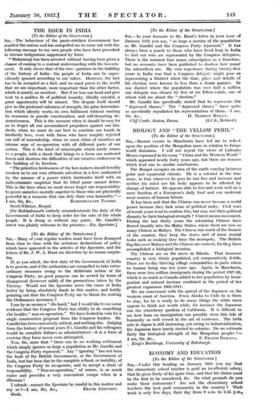[To the Editor of the SPECTATOR.'
S1R,—Many of your regular readers must have been dismayed from time to time with the nebulous declarations of policy which have appeared in the articles of the Spectator, and the letters of Mr. J. W. A. Hunt are therefore by no means surpris- ing.
If, as you admit, the first duty of the Government of India is to govern, and if the authorities are compelled to take extra- ordinary measures owing to the deliberate action of the Congress Party, no good purpose can be served by tones of disapproval (however mild) of the precautions taken by the Viceroy. Would not the Spectator serve the cause of India better by being absolutely frank in this matter, and boldly pointing out that the Congress Party are to blame for making the Ordinances necessary ?
I am by no means a " die-hard," but I would like to see some evidence that the Congress Party has ability to do something else besides " non-co-operation." We have looked in vain for a single constructive proposal from the Congress leaders. Mr. Gandhi has been excessively critical, and nothing else. Judging from the history of recent years Kr. Gandhi and his colleagues would be complete failures as administrators—it is a form of exercise they have never even attempted.
You, Sir, state that " there can be no working settlement which Simply ignores so large a population as Mr. Gandhi and the Congress Party represent." Any " ignoring " has not been the fault of the British Government, or the Government of India, but has been due to the complete refusal, or inability, of the Congress Party to co-operate, and to accept a share of responsibility. " Non-co-operation," of course, is so much easier and provides a very convenient escape when in a dilemma I
I' submit—cannot the Spectator be candid in this matter and




































 Previous page
Previous page